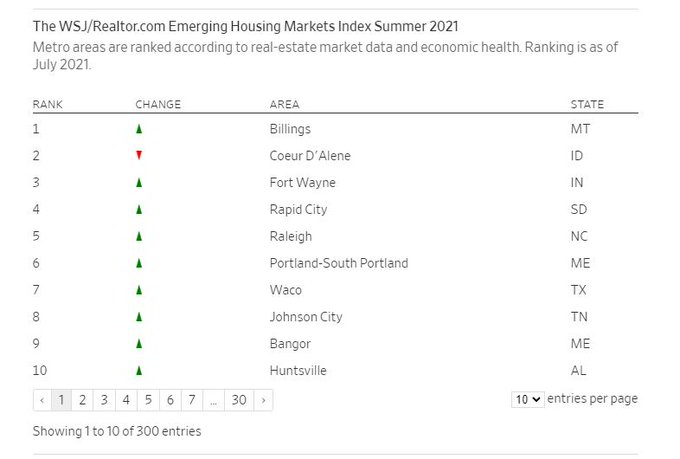And the Number #1 Housing Market in America Is …
The average population of the top 20 metros on the WSJ/Realtor.com Housing Market Index is just 300,000. That’s not the whole story, however.
For the first time in more than a decade, my wife and I are looking at moving. So it piqued my interest when I stumbled upon a Wall Street Journal article examining the hottest housing markets in the US.
For those unaware, the Journal regularly publishes the Emerging Housing Markets Index, a collaborative project with Realtor.com that ranks housing markets in the top 300 metros across the US on various factors, including real-estate demand, price trends, wages, small business activity, and employment opportunities.
This underscores one of the strengths of the US system: federalism.
It turns out that Billings, Montana, claims the top spot in America because of its beauty, strong appeal to remote workers, and affordability. For homeowners in Billings, the results have been favorable.
“The average single-family home-sale price in Billings and the surrounding area was $376,248 in June, up 32% from a year earlier, according to the Billings Association of Realtors,” the Journal notes.
That’s not the whole story, however. It turns out that Billings is part of a much larger trend. According to the index, smaller metros are dominating larger ones in home buying activity. In fact, the average population of the top 20 cities on the index is just north of 300,000. Home prices in these markets rose 13.7 percent over the last year, on average, and include the likes of Coeur D’Alene, Idaho, Fort Wayne, Indiana, Rapid City, South Dakota, and Huntsville, Alabama.
While no single factor explains the trend, evidence suggests that Americans are “voting with their feet” to embrace safer, freer communities. (Respondents who moved to Montana admitted safety was an important factor in their decision, following the most violent year in the US in decades, while others cited low taxes.)
Don’t be surprised if more Americans decide to exercise one of their great freedoms: the power of exit.
This underscores one of the strengths of the US system: federalism. In their wisdom, America’s founders realized that the best way to protect liberty was to disperse power by allowing the states to be largely self-governing. As “laboratories of democracy” (to use the phrase of Justice Louis Brandeis), states and local governments will naturally govern in different ways, and as long as citizens enjoy the freedom of movement they will tend to gravitate toward states and communities that are peaceful, prosperous, and suited to their needs.
With many major US cities (and states) struggling under massive debt, regulatory burdens, and dysfunctional governments that only got worse during the pandemic, don’t be surprised if more Americans decide to exercise one of their great freedoms: the power of exit.
*****
This article was published on July 21, 2021 and is reproduced with permission from FEE, Foundation for Economic Education.





